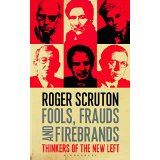Why You Can't Argue with the New Left
By Arnold Kling

Practical men, who believe themselves to be quite exempt from any intellectual influence, are usually the slaves of some defunct economist. Madmen in authority, who hear voices in the air, are distilling their frenzy from some academic scribbler of a few years back1
Conservative British philosopher Roger Scruton’s most recent book, Fools, Frauds and Firebrands: Thinkers of the New Left,2 critiques academics who did their scribbling in the twentieth century, creating what became known as the New Left. Most of the intellectuals profiled by Scruton are continental Europeans whose names are unfamiliar to most Americans today. Although few of us are conversant with the likes of Theodoro Adorno, Gyorgy Lukacs, and Slavoj Zizek, reading about them makes one realize how much of an imprint they have left on contemporary college campuses and even on the approach to politics taken by Barack Obama.
A major theme of Fools is that the New Left evolved a set of intellectual tactical moves against their opponents. These included creating a false left-right spectrum, delegitimizing other points of view, indicting capitalism and tradition for all wrongs while being vague about alternatives, and using Newspeak to present authoritarianism as a defense of freedom and human rights.
For background information, see Fascism, by Sheldon Richman, Communism, by Bryan Caplan, and Capitalism, by Robert Hessen in the Concise Encyclopedia of Economics.
Scruton sees the left-right spectrum as part of the attempt to romanticize the support for communism. In the left-right framework that the New Left employs, the far right is represented by fascism and Nazism, the most heinous ideologies in history. Conservatism is less extreme, but it also falls on the evil side of the spectrum. As you move to the left, you become better. Communism is the ideal, but it has yet to be realized. For the New Left, totalitarian repression under communism is an unfortunate accident, not at all equivalent to the repression that is intrinsic to fascism. On the left-right spectrum, communism is the opposite of fascism.
Scruton notes that the French communists, who bragged about their resistance to fascism, only joined the anti-Nazi cause in June of 1941, when Germany attacked the Soviet Union. In contrast, when Hitler conquered France in 1940,
… the communists were in some measure responsible for the erosion of the will to fight the Nazis, being under indirect orders from Hitler during the crucial months of France’s defeat. (It was thanks to the PCF that the munitions factories went on strike when Hitler—then the beneficiary of the Nazi-Soviet pact—marched on France.)
Another tactic Scruton attributes to the New Left is delegitimization.
Once identified as right-wing you are beyond the pale of argument; your views are irrelevant, your character discredited, your presence in the world a mistake. You are not an opponent to be argued with, but a disease to be shunned.
Thus, in Jurgen Habermas’ call for democratic deliberation,
… the dialogues that Habermas now advocates, in the wake of 9/11, are noticeable for the voices they exclude: no nationalists, no social conservatives, no pre-modernists or fervent free-marketeers will be invited to the table, when the postmodern future of mankind is plotted in the Habermasian bunker. And by excluding so much of ordinary humanity from his chatter-house, Habermas avoids the real questions that confront us, recommending that we discuss them only to avoid discussing them. That, I suspect, is what the new Europe is all about.
For the New Left, existing institutions serve no useful purpose. They only allow the strong to dominate the weak. The term “capitalism” is used to indicate such a system of domination.
Two accusations against our political inheritance have been lodged in the brains that I have examined in this book: first, that ‘capitalist’ society is founded on power and domination; second, that ‘capitalism’ means ‘commodification’; the reduction of people to things, and the fetishizing of things as agents.
“The writers of the New Left are never specific about what will replace capitalism.”
The writers of the New Left are never specific about what will replace capitalism. Instead, they view it as obvious that tearing down existing institutions will be sufficient to bring about utopia. Because the capitalist system is the source of all evil, once you destroy it, only good will remain.
This approach gives the New Left the ability on offense to attribute every imperfection in society to existing institutions, especially markets. On defense, the New Left itself offers no program with specifics that might be attacked.
Finally, the New Left has appropriated terms like freedom and democracy while taking positions that are hostile to both. This is the tactic of Newspeak. For example, John Kenneth Galbraith and other critics of capitalism treat the cornucopia of consumer goods as a tool of capitalist oppression, with our desire for products artificially manipulated by advertising.
This story turns the proof of our freedom—namely, that we can obtain what we want—into the proof of our enslavement, since our wants are not really ours.
Newspeak in the field of legislation makes a mockery of the rule of law.
See the biography of Friedrich Hayek in the Concise Encyclopedia of Economics for background information.
There is nothing to prevent the radical legislator from passing laws that fly in the face of justice, by granting privileges, confiscating assets and extinguishing deserts in the interests of some personal or political agenda. One sign of this is the adoption of ‘social justice’ as the goal of law, rather than natural justice as a procedural constraint. For [Friedrich] Hayek, by contrast, the goal of common law is not social engineering but justice in the proper sense of the term, namely the punishment or rectification of unjust actions.
Scruton exposes the Newspeak treatment of labor freedom under capitalism by the New Left.
… are we not tired, by now, of this tautologous condemnation of the free economy, which defines that which can be purchased as a thing and then says that the man who sells his labour, in becoming a thing, ceases to be a person? At any rate, we should recognize that, of all the mendacious defences offered for slavery, this is by far the most pernicious. For what is unpurchased labour, if not the labour of a slave?
To recapitulate, the New Left uses these approaches to advance its ideology:
- providing a misleading left-right spectrum to frame viewpoints
- demonizing opponents as unworthy to participate in public debate
- associating existing institutions with evil outcomes while providing few specifics about how those institutions ought to be replaced
- using Newspeak to characterize freedom as slavery
Where this leads, Scruton suggests, is an intellectual form of totalitarianism, unable to tolerate dissent or to engage with those who might disagree. In discussing Antonio Gramsci, Scruton writes,
Thus to the realist who asks how, in this society of the future, conflicts are to be accommodated or resolved, Gramsci has no reply. The communist shares with the fascist an overriding contempt for opposition. The purpose of politics is not to live with opposition, but to remove it—to achieve the condition in which opposition no longer exists.
In his concluding chapter, Scruton writes,
Almost all the thinkers I have discussed in this book have adopted the same annihilating approach to their opponents as leftist parties in power. For the opponent is the class enemy. Should he put his head above the parapet in the culture wars he is not to be argued with, for he cannot utter truth… Such an enemy is not to be the object of negotiation or compromise. Only after his final elimination from the social order will the truth be perceivable.
For related topics, see the EconTalk podcast episode Kling on the Three Languages of Politics, June 2013.
This seems to explain one of the more troubling stories of 2015, which was the widespread assault of free speech on American college campuses. Also, it may explain why President Obama has seemed to govern more by unilateral executive action than by negotiation with Congress. As obscure and seemingly outdated many of the New Left writers discussed in Fools seem to be, the tendencies that Scruton identified make his critiques seem quite relevant to the contemporary scene.
For more articles by Arnold Kling, see the Archive.

